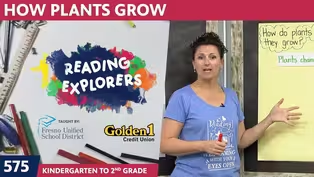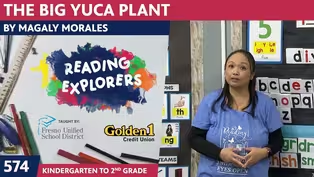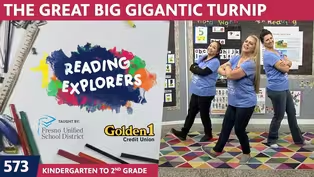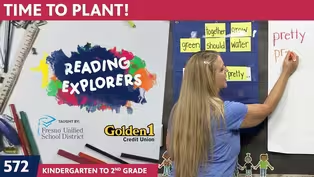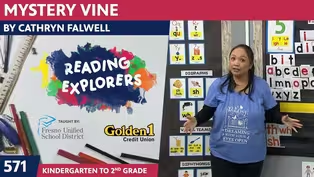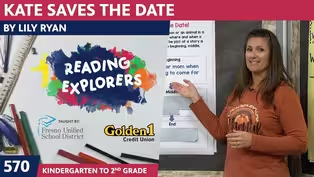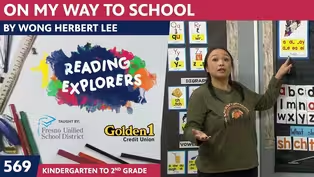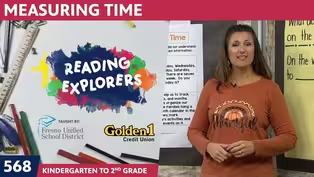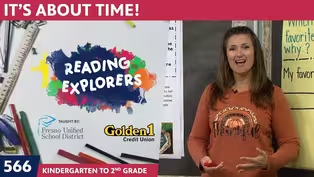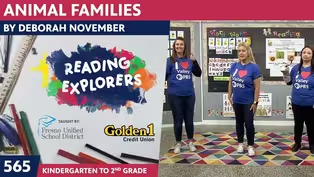
3-339: Root & Compound Words
Season 3 Episode 214 | 14m 13sVideo has Closed Captions
Join Mrs. Nix at Camp Discovery!
Third Grade teacher, Mrs. Nix, welcomes students back to Camp Discovery, a fun learning space packed with reading adventures & fun games!
Problems playing video? | Closed Captioning Feedback
Problems playing video? | Closed Captioning Feedback
Reading Explorers is a local public television program presented by Valley PBS

3-339: Root & Compound Words
Season 3 Episode 214 | 14m 13sVideo has Closed Captions
Third Grade teacher, Mrs. Nix, welcomes students back to Camp Discovery, a fun learning space packed with reading adventures & fun games!
Problems playing video? | Closed Captioning Feedback
How to Watch Reading Explorers
Reading Explorers is available to stream on pbs.org and the free PBS App, available on iPhone, Apple TV, Android TV, Android smartphones, Amazon Fire TV, Amazon Fire Tablet, Roku, Samsung Smart TV, and Vizio.
Providing Support for PBS.org
Learn Moreabout PBS online sponsorshipMore from This Collection
Valley PBS and Fresno Unified School District have partnered with Golden 1 Credit Union to create Reading Explorers Lessons for grades Pre-Kindergarten through Third grade. The daily lessons will be taught by Fresno Unified School District teachers and are created to help students practice their reading skills and reinforce lessons during distance learning.
Video has Closed Captions
Learn about the life cycle of a plant on Reading Explorers. (26m 39s)
K-2-574: The Big Yuca Plant by Magaly Morales
Video has Closed Captions
Join the Reading Explorers as we adventure into a new book The Big Yuca Plant. (26m 30s)
K-2-573: The Great Big Gigantic Turnip
Video has Closed Captions
What will happen at The Great Big Gigantic Turnip? (26m 30s)
K-2-571: Mystery Vine by Cathryn Falwell
Video has Closed Captions
The Bell has rung and the Valley PBS Classroom is open once more. (26m 32s)
K-2-570: Kate Saves The Date by Lily Ryan
Video has Closed Captions
Mrs. Nix, Mrs. Hammack and Mrs. Vang are glad to have you join her for a new day. (26m 32s)
K-2-569: On My Way To School by Wong Herbert Lee
Video has Closed Captions
Mrs. Vang is ready for a new day of phonemic awareness and reading comprehension. (26m 40s)
Video has Closed Captions
We review phonics, frequency words and more on Reading Explorers. (26m 45s)
K-2-567: Nate The Snake Is Late
Video has Closed Captions
What happens when Nate the Snake is late to school? (26m 49s)
Video has Closed Captions
It's time for school! How do you know what time it is? (26m 31s)
K-2-565: Animal Families by Deborah November
Video has Closed Captions
Welcome to the Reading Explorers lessons in the Valley PBS Classroom. (26m 14s)
K-2-564: From Caterpillar To Butterfly
Video has Closed Captions
The transformation from Caterpillar to Butterfly is a special one. (26m 52s)
Providing Support for PBS.org
Learn Moreabout PBS online sponsorship♪ Good morning to a brand new day ♪ ♪ Time to learn and the games you play ♪ ♪ Learning things is so much fun ♪ ♪ Learning is good for everyone ♪ (upbeat music) (whistles) - Good morning third graders, my name is Mrs. Nixon I am so excited to be here with you, to support you as you become amazing thinkers, readers and writers.
This morning, I was going through and playing with some of my fun activities, there's dot to dots and mazes and all sorts of puzzles that are inside these activity books.
If you are interested in getting one of these free books, it's super easy.
You see that address that's popping up on the bottom of your screen, all you need to do is send me a letter.
You can let me know.
Maybe it's something you're learning at school, something you've learned here at PBS or maybe it's just a book that you wanna share with me and let me know why you've enjoyed reading it.
I'd love to hear your letter, and when I receive it, I'll make sure that I put one of these fun activity books in the mail for you.
Now, if you decide to send me an email don't forget to include that return address so I can make sure that you get one of these.
Okay, speaking of books and reading, here in Fresno Unified we love to celebrate our readers.
We're always encouraging you to check out your books through your County library or through our free app that we have, called Sora, and we've got some schools.
We count down the top five schools that have been checking out books through Sora.
And today, we're gonna reveal who is in the second place and that is Ewing Elementary.
So great job Ewing.
If you'd like to see your school listed on our shout-out board here for the top checking out schools, it's super easy to do.
All you need to do is check out those books and tell a classmate or two and then you guys can help get your school listed, okay.
I have three things that we're gonna go through and practice today.
We gonna look at compound words, syllables, and then finish off with root words.
A little comprehension with that.
Are you ready to start today?
Okay, let's get out and practice.
Let's warm up those brains looking at our high frequency words.
Now remember, high frequency words are simply that, they're words you're gonna come across often, in third grade, it's really important that you're not able to just, just be able to read them but you need to be able to spell them correctly.
So if you see a word up here make sure you jot it down, practice it and you know, I know that many of you have been doing that.
So great job.
Keep that up.
I love that, you're showing that you are responsible for your learning.
Okay, let's go through and let's read them together.
Here we go.
Was, warm, wash, walk, water, way, went, well, were and where.
Nicely done, okay.
Today we are over here, we're doing went and well.
Went is a W-E-N-T and well is W-E-L-L.
Okay, let's use them in a couple of sentences.
I thought today's lessons went hmm, and he hmm to the grocery store, to the store yesterday.
So would we say he well to the grocery or he well to the store yesterday?
No, we would say he went to the store yesterday and I thought today's lessons went well.
All right, excellent job.
Okay, third grade today we're gonna talk about compound words and syllable.
So let's start with compound words.
Remember compound words are simply that there's two words that are put together and they make up a new word.
Okay, let's think about these today.
So when we think about the word hand, we know that our hand is simply that something we have and writing, well you can even look right here, like I've got some writing on this piece of paper but when we put hand and writing together it now makes a new word handwriting and you can see what Mrs. Nix's his handwriting looks like because all of these were written by me, they weren't done by a computer or anything.
So that's what my handwriting looks like.
I'm curious what your handwriting looks like.
Maybe when you write those letters, I can see them.
All right, then we've got bare, which means empty or not covered, it's just bare.
And then we've got foot.
And that would be like where your toes and things that you walk on.
Okay so then we put that together and we've got a barefoot.
Well, that just simply means that your foot doesn't have any socks or shoes.
Right, you have a barefoot.
Okay, last one we've got basket.
So if you think about a basket you might have a wastebasket or a basket where you collect things.
It's usually woven together.
And then you've got a ball any kind of round ball, a soccer ball, a basketball.
So in this case, we put basket and ball together and we now have a sport that we refer to basketball.
And remember in basketball they do use a basket to throw like a little hoop.
Okay, when we come down here we gonna talk about some syllables.
Now, when a word ends with a consonant followed by le or al, the consonant plus the le usually form the last syllable of the word.
Okay, now there's different ways you can spell that all at the end.
Le is one of them.
You can also do el, al and il.
So I have examples using all three of those spellings.
So let's look right here.
We've got the word scribble.
Now I'm looking right here, I've got the le at the end.
I'm gonna put that consonant that comes right before the le and that makes that be a syllable all by itself.
So I'm gonna spread it apart just a little bit so we can see that there are two syllables scrib ble, okay.
Same can be done with kennel.
You see the el at the end that has that o sound at the end so I'm gonna put the final consonant goes with the el so we split it apart and we have ken nel two syllables.
How about this one?
Rental, see that al at the end, the al gonna take that final consonant, which is a t and that makes our final syllable.
So we have ren tal and then the last one cil we've got the il so it's gonna take that final consonant which is the cil and we have two syllables pen cil.
So kind of helps with our spelling too when we know how to divide our words into those syllables.
Okay, let's look, and let's do a little bit of practice with some of these compound words and the syllables that we've been practicing.
So there are a whole lot of little words that are up here.
And so this is one of those activities that especially at home, when you come across small words you can make as many words in those activity books.
You're gonna find things like this where you can go through and you can make up some of your own words out of other words, it's a lot of fun.
Okay, so let's look and see if we can make a few today.
So just looking here we have words like wind, birth, thumb, news, time.
So I'm gonna go through and kind of help us out a little bit because I know that it's a lot for you to be able to see.
So when I look here and I see the word wind, wind I know I can put wind with hmm, how about this one over here?
How about windshield?
Okay, a windshield is something that is on the front of our cars, right?
It's that glass that covers it up.
So when we put it together, it shields us from the wind, right?
It's a windshield.
Okay, I'm gonna cross them off 'cause now I've used them.
Okay, we've done birthday several times so I might skip that one.
But how about thumb?
Can you think about compound word that we would use with thumb?
Okay, I'm gonna give us a clue.
Let's go over here and look at the, at this column here.
So we've got thumbday, no.
Thumbever, no.
Thumbcoach, no.
How about a thumbnail?
Do you have a thumbnail?
Yeah, it's just that nail that's right there on your thumb.
So let's put it together and now we have thumbnail.
Look at that.
Excellent job.
How about let's do another one.
We've done news.
How about time, time?
What could we put with time?
How about, ooh, let's look over here on this column we've got timewriting, timeout.
Ooh, yes, how about time and out?
Do you ever take a timeout maybe when you're playing a game and you need to take a quick break?
Yes, all right.
Let's do one more, one more.
How about, well, ooh, look right here.
What about we have the word stage and the word hand.
Do you know what a stagehand is?
It's a person who, oops, who started spelling all my words together let's try it again.
Stage, see if I can spell that together stagehand.
So when you're working on a stage, sometimes you need someone who's gonna be able to help you, they're gonna give you an extra hand, a stagehand.
Excellent, okay let's look down here below.
So this one, we have all of these words here and some of them do not have that consonant le, el, al, or il at the end, so we gonna put an X on any of them that don't have that, and then we're gonna sort our words.
We gonna kind of do it together as we go along.
So do we see that final syllable with the al, il, el in pupil?
We do, so I'm just gonna move it right now and I'm gonna put it over here.
How about people?
Do you see it?
Yeah, it's got the le so we're gonna move it.
How about angel?
Does it have the o at the end?
It does, and it's got the el so let's move it over here.
How about animal?
Yes it's got the al good.
How about elephant?
Nope, that one does not.
How about channel?
Yes, it's got the el good.
Keep going.
Middle has le so we're gonna move it over here.
Pencil has the il and I'm gonna put it right there.
See how much fun it is to be able to move all of those things.
You could do things like that when you're at home with your words.
Now, I do wanna finish off today with some root word practice.
So this is that comprehension piece.
What's a root word?
Well, it's the simplest form of a word simply means that there's no prefix, no suffix, no inflectional endings have been added to the word, it's just by itself.
And when we get that root word by itself oftentimes we know what that word means and we can start to put it all back together like a puzzle and make it make sense.
Okay, so let's look at a sentence here.
Ooh, you can remember what prefixes and suffixes are?
No worries, I wrote a little cheat sheet down here.
Prefixes are at the beginning like un, re, dis.
Suffixes are at the end like ful and able and inflectional endings are simply ing, ed, things of that nature.
Okay, so let's look here is our sentence, she was overjoyed to find out she won the prize.
So let's look, are there any prefixes?
Yes, over is a prefix.
How about, are there any suffixes?
No, but do you see the inflectional ed?
I do, it's the ed, perfect.
So what does our word joy mean?
That's right, just joy, happiness.
So joyed means that it happened in the past and over means a whole lot.
So if you're overjoyed, it means that you are full of joy abundantly.
All right, excellent job.
So, thanks for hanging out with me today, as you're getting ready for school, remember you are responsible for your learning success.
So listen, ask questions and share your ideas because together we can do so much more.
Have a great day, I'll see you tomorrow, bye-bye.
(upbeat guitar music) ♪ Good morning to a brand new day ♪ ♪ Time to learn and games to play ♪ ♪ Learning things is so much fun ♪ ♪ Learning is good for everyone ♪ (upbeat guitar music)
Support for PBS provided by:
Reading Explorers is a local public television program presented by Valley PBS
